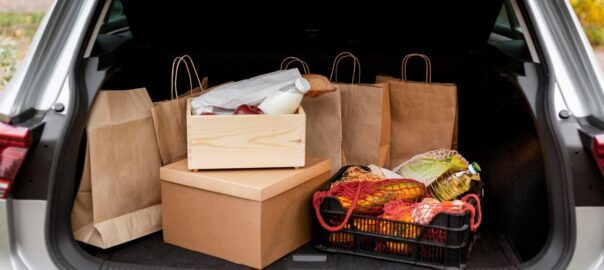
Life is always expensive, but food can be especially pricey. Professional shoppers save a lot of money each month on their grocery bills. But if you don’t know how to shop like one, here are some tricks many people are using to cut down their grocery spending.
1. Make a grocery list.
It’s easy to go into the store and buy whatever looks good. But if you make a list, you can avoid buying items that are not on your list. This allows you to plan out your meals for the week so that nothing goes to waste and money isn’t wasted on extras.

It’s also important to stick to your list. If you see something on sale that you want but isn’t on your list, consider waiting until next week to buy it. The same goes for coupons: if you see one for an item that’s not on your list, don’t buy it unless you really need it.
2. Plan your meals
When you plan your meals, you can make sure that the items on your list will be enough to feed your family. This also helps you avoid buying too many ingredients for one meal and having leftovers that go bad before they get eaten.
It’s better to buy fewer ingredients but use them all than buy lots of ingredients which might go bad in a few days. Additionally, the more you plan your meals, the less likely you are to waste food.
3. Don’t shop when you’re hungry.
When you’re hungry, it’s easy to get carried away by the desire for tasty treats or comfort food. You may also be tempted to buy more than you need because you’re feeling famished or stressed.
If you do your shopping when you’re hungry, it can lead to a lot of unnecessary purchases or waste. You’ll end up throwing away food that doesn’t get eaten before it spoils.
Instead, try to make sure that you have a meal before you go grocery shopping so that you don’t fill up on snacks while you’re there.
4. Avoid buying convenience foods.
Convenience foods are usually more expensive than buying the ingredients you need and preparing them yourself. For example, if you buy a frozen pizza that’s on sale at $5 per serving instead of making your own homemade pizza using fresh ingredients for less than $3 per serving, you’ll end up spending more money over time.
And while it might seem like no big deal to grab some fast food once in a while when you’re feeling rushed or tired, remember that these meals can add up over time.
5. Shop store brands and generic brands.
When you’re shopping for groceries, it’s not always necessary to buy the most expensive brand. Many products are available in both name-brands and store-brands version, and often times the store brands might might better quality. This is because local store-brands are usually from small farmers who use little to know additives on their products.
If for any reason you decide to buy the name-brand version, it’s important to check the ingredients. Some brands will use additives and preservatives that aren’t as healthy, but can be avoided by using a different product.
6. Buy in bulk.
Buying in bulk can save you money, especially if you have a large family to feed. Most stores offer discounts for purchasing more than one item at a time, and it’s often cheaper than buying smaller quantities at regular price.
For example; there are stores in the US that offer heavy discounts on bulk purchase like Costco stores. The only downside is that most bulk purchases have to be used within a specific time frame, so make sure you don’t buy too much.
7. Stock up on sale items.
This is a great way to save money. Stores often put items on sale for a limited time, and if you buy them at that price, you can use them later without feeling like you’re wasting money.
For example; if there’s a sale on chicken breasts, buy as many as you can afford and then freeze them until needed.
8. Keep an eye out for deals from your favorite stores and manufacturers.
Many stores and manufacturers have coupons that you can use to get discounts on your purchases. The best way to find these is by signing up for the store’s email list or following them on social media.
If you don’t want to get emails from stores, you can also look online for coupons. Sites like Coupons.com have a variety of coupons that are easy to use and print out. If the store doesn’t have a coupon available, try using one of their competitors’ or another retailer’s coupon instead.
9. Find a grocery that gives discounts for older adults, students or military personnel.
Some grocery stores offer discounts on certain items for seniors, students or military personnel. If you have one of those IDs, check with your local grocery store to see if they offer any discounts.
But if you don’t fall into this category, you can still get a discount at many grocery stores, including Kroger, Giant and Safeway. Just ask your local store manager if they offer any discounts on certain items.
You could also look into the following grocery discount programs;
The Senior Shopping List: This program is a free app that lets you create a grocery list and then find coupons for items on your list. It also includes deals at local stores, so you can save even more money on your groceries.
Kroger Fuel Rewards: You can earn points toward gas rewards when shopping at Kroger with this free program. When you shop at Kroger or one of its affiliates like Harris Teeter or Food 4 Less, use the store’s mobile app to scan bar codes on products as you shop to earn points quickly.
Coupons.com: This is a website that has coupons for groceries, household items and more. You can also find printable coupons to use at retailers like Target, Rite Aid and CVS.
Checkout51: This app lets you earn cash back when shopping at select stores including Walmart, Kroger, Target and more. It offers hundreds of products from brands like Kellogg’s, Nabisco, Coca-Cola
10. Eat out less often to save money on groceries.
Eating out is expensive. Even if you just get a sandwich and drink, it will cost you several dollars more than making the same meal at home. If you eat at restaurants or purchase prepared foods frequently, try to reduce the number of times you do so each month.
If you want to eat out more often, do so on a budget. Make sure that you have a set amount of money for eating out each week and plan accordingly.
11. Check for coupons and sales flyers before you shop.
You can save a lot of money by using coupons, sales flyers, and other promotions. Before you shop, check out the store’s website or sign up for its email list so that you can receive updates on special offers and deals in your area. You can also check online sites like CouponMom, RetailMeNot and Groupon to find coupons for local stores near you.
Conclusion
We hope you’ve found this article helpful! While every tip is not applicable to every household, hopefully at least some of the advice will be useful in keeping your food bill low.
With a little bit of planning and forethought, you can save a lot of money on your groceries. You might not have time to do all these things every week, but try implementing some of them into your regular routine. It won’t take much effort on your part and will give you more money in the long run!


